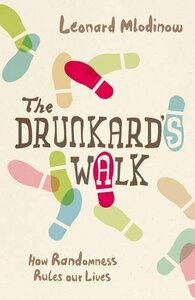Take a photo of a barcode or cover
well... interesting ig and i have discovered a new incredible way to get through nonfiction books by listening to the audiobook while reading so it seemed less boring
some parts were intriguing and good to learn about but im not sure how helpful this actually is 🤷♀️
some parts were intriguing and good to learn about but im not sure how helpful this actually is 🤷♀️
challenging
informative
reflective
medium-paced
In The Drunkard's Walk: How Randomness Rules Our Lives, Leonard Mlodinow makes a compelling central argument: our inability to evaluate (or, in many cases, even recognize) randomness often leads us astray. This is due both to the counterintuitive nature of many problems in probability, but also because we lack the tools and practice to think such problems through. To that end, Mlodinow introduces ideas like statistical independence and conditional probability, as well as numerous fallacies (The Gambler's Fallacy, the Sharpshooter's Fallacy, etc.) through a series of stories and studies from the business, psychology, and sports worlds. He also traces the history of many innovations in the theory of probability and statistics. He does both in a way that are that were able to sustain a math major's attention and give a bit more color to the ideas that I learned in my probability theory courses.
That being said, there are some serious errors. One technical mistake I noticed while reading came in his discussion of hypothesis testing. According to Mlodinow, based on the available evidence, we can either reject or "accept" a hypothesis. In reality, we can either reject or fail to reject. While it may seem like I am being pedantic, there is an important difference: a test can fail to produce statistically significant results, either because the null hypothesis is true or because we lack evidence to reject it. This language is drilled into your head in any introductory statistics course, so it was surprising to see an expert make such a basic mistake.
Where this book seriously falters is Chapter 8, in its discussion of Francis Galton. Now, in the history of science, Galton definitely has a place – he developed both the statistical concept of correlation and the phenomena of "regression toward the mean." Still, much of his scientific work was dedicated toward the pseudo-scientific ideology of eugenics (for which he coined the term).
Mlodinow treats this only in passing and dismisses any serious contemplation of his tainted legacy: "The term and some of his ideas were adopted by the Nazis, but there is no evidence that Galton would have approved of the German's murderous schemes. His hope, rather, was to find a way to improve the condition of humankind through selective breeding" (161).
There is, however, evidence Galton would approve of such "schemes". Five minutes on Wikipedia shows that he argued for the displacement of Indigenous Africans by the Chinese, citing the latter's racial superiority. He has also reportedly stated that "there exists a sentiment, for the most part quite unreasonable, against the gradual extinction of an inferior race." More importantly, genocide is the logical consequence of the desire to selectively "improve" humanity through eugenics. These two cannot be disentangled. In light of this information, summarizing his beliefs as "that our lives can be determined by our personal qualities" (193) is almost lying by admission.
The history of science is troubling at times. Scientific methods have been (and continue to be) misappropriated to advance racial and ethnosupremacist political projects. We need to be able to treat these subjects with the nuance and care they deserve, and it was frustrating to see Mlodinow abdicate this responsibility.
Ultimately, The Drunkard's Walk is the kind of airport read that is ambitious enough in scope and flawed enough in execution (I'm not sure what other social scientists would make of some of the research cited here) that I would not be surprised to see it get its own episode on the If Books Could Kill podcast. That is, if there wasn't an endless stream of reactionary self-help books and conservative political manifestos to get through first.
That being said, there are some serious errors. One technical mistake I noticed while reading came in his discussion of hypothesis testing. According to Mlodinow, based on the available evidence, we can either reject or "accept" a hypothesis. In reality, we can either reject or fail to reject. While it may seem like I am being pedantic, there is an important difference: a test can fail to produce statistically significant results, either because the null hypothesis is true or because we lack evidence to reject it. This language is drilled into your head in any introductory statistics course, so it was surprising to see an expert make such a basic mistake.
Where this book seriously falters is Chapter 8, in its discussion of Francis Galton. Now, in the history of science, Galton definitely has a place – he developed both the statistical concept of correlation and the phenomena of "regression toward the mean." Still, much of his scientific work was dedicated toward the pseudo-scientific ideology of eugenics (for which he coined the term).
Mlodinow treats this only in passing and dismisses any serious contemplation of his tainted legacy: "The term and some of his ideas were adopted by the Nazis, but there is no evidence that Galton would have approved of the German's murderous schemes. His hope, rather, was to find a way to improve the condition of humankind through selective breeding" (161).
There is, however, evidence Galton would approve of such "schemes". Five minutes on Wikipedia shows that he argued for the displacement of Indigenous Africans by the Chinese, citing the latter's racial superiority. He has also reportedly stated that "there exists a sentiment, for the most part quite unreasonable, against the gradual extinction of an inferior race." More importantly, genocide is the logical consequence of the desire to selectively "improve" humanity through eugenics. These two cannot be disentangled. In light of this information, summarizing his beliefs as "that our lives can be determined by our personal qualities" (193) is almost lying by admission.
The history of science is troubling at times. Scientific methods have been (and continue to be) misappropriated to advance racial and ethnosupremacist political projects. We need to be able to treat these subjects with the nuance and care they deserve, and it was frustrating to see Mlodinow abdicate this responsibility.
Ultimately, The Drunkard's Walk is the kind of airport read that is ambitious enough in scope and flawed enough in execution (I'm not sure what other social scientists would make of some of the research cited here) that I would not be surprised to see it get its own episode on the If Books Could Kill podcast. That is, if there wasn't an endless stream of reactionary self-help books and conservative political manifestos to get through first.
funny
informative
medium-paced
why am i suddenly interested in probability after i took it in college, and almost failed? i loved hearing all of the academic beef, and mathematic lore. good pacing, and easy to understand.
I started this book three weeks ago but didn't ever mark it here. It was a very good book. I was looking to study randomness and found this book. Though I was looking for the mathematical underpinnings of randomness (algorithms, computer simulations, etc) I discovered how much I need to really study the math behind randomness, basically Probability and Statistics. These two subjects have seemed 1) scary and complex, and 2) boring and factual. But after reading this book I have a better idea that studying these two mathematical subjects are exactly what I need to do to completely understand randomness.
One interesting fact to point out is even though the book talks about randomness the reality is that this book does a great job of showing how we really think and how we, as humans, use pattern recognition to make sense of completely random events. At times I found myself questioning the author audacity of a claim but by the end I see his point. We can try to make sense of random events but it could be a more interesting life if we didn't. Some of the buddha's philosophy is really about acceptance of the random events and observing the reactions within ourselves to better understand our own suffering. In some respects I'm using pattern recognition in that last sentence to make sense of random events and actions but at the same time I think that was what the buddha was doing as well.
Really, a good book and leads to more profound thoughts.
One interesting fact to point out is even though the book talks about randomness the reality is that this book does a great job of showing how we really think and how we, as humans, use pattern recognition to make sense of completely random events. At times I found myself questioning the author audacity of a claim but by the end I see his point. We can try to make sense of random events but it could be a more interesting life if we didn't. Some of the buddha's philosophy is really about acceptance of the random events and observing the reactions within ourselves to better understand our own suffering. In some respects I'm using pattern recognition in that last sentence to make sense of random events and actions but at the same time I think that was what the buddha was doing as well.
Really, a good book and leads to more profound thoughts.
Fantastic first half on statistics, but drags and gets a bit boring after the nth mathematician's biography is discussed. Overall, a good educational and entertaining read. Oh yeah, be prepared to re-read a few of the math sections (if you're a little slow like myself).
funny
informative
reflective
medium-paced
challenging
informative
slow-paced
The Drunkard's Walk was a very enjoyable read for me, though disappointingly light on actual math and theory. But, the historical anecdotes and the clear, conceptual explanation of probability and randomness made up for it. Mlodinow convincingly explains how randomness can easily explain things from seemingly large movements in poll numbers to Donald Trump's occasional non-failures to "streaky" athletes. I think it would be a fantastic book for someone who is interested in probability and randomness, but intimidated by the math.
It's interesting, but it's a bit heavy on ideas and concepts, and a bit scanty on actual math.




